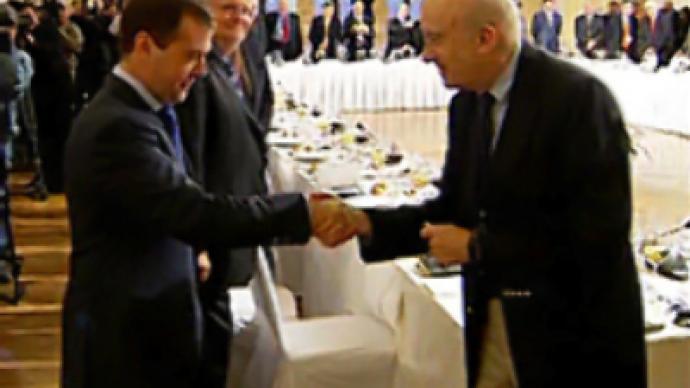Russian press on Friday

The meeting of the “Valdai Club” in Sochi is the center of attention for the Russian print press today. Apart from that, there is an interview with the former French Foreign Minister, now one of the best analysts of European and World politics
Here is a review of some of today’s articles:
VEDOMOSTI’s report from Sochi calls Prime Minister Vladimir Putin’s remarks to foreign political scientists “Counterpropaganda in its highest form”. The report summarizes Putin’s speech as Western Europe doesn’t have a foreign policy of its own; the U.S. aid in the training of the Georgian military was a waste of effort and means; Russia’s mineral resources exports can be re-oriented from the West to the East.
KOMMERSANT reports from the same event saying that Vladimir Putin “demonstrated militant pacifism” in his speech. The paper writes the Prime Minister was tough in his wording when he was describing the options Russia had immediately after the Georgian attack on Tskhinval. The article continues to say that the meeting of Western political scientists with the Prime Minister went on for three hours and closer to the end of it the topic of the conversation shifted from South Ossetia and Abkhazia, and the situation around the recent conflict, with all of its political and diplomatic implications, to the probability of a new cold war or a new round of nuclear armaments reduction. The Prime Minister, says the paper, suggested it may be negotiable to not just reduce but get rid of nuclear weapons entirely. The only problem here, he said, is that not all the players would be ready to be the first to start.
The same paper writes, analyzing one of the latest opinion surveys by the Russian Institute for Public Opinion Research, that Russians seem to be warming to the idea of a new cold war. As paradoxical as it sounds, many agree that in the times of the only cold war we knew, the one between the West and the Soviet Union, the world was much safer than today.
ROSSIYSKAYA GAZETA also has a report from Sochi. It says, the meeting with Vladimir Putin will be long remembered by the participants, Western political scientists and journalists. The paper quotes German political scientist Alexander Rahr: "Those who wanted a cold-war type war of words were definitely disappointed. The Head of the Russian government didn’t close a single door, a single path open for dialogue today… He basically said that if the West tries to push Russia out of Europe, then Moscow can use its other options. For instance, turning to Asia and reassigning its energy exports in that direction.
The same newspaper has an interview with Roland Dumas, the former French Minister of Foreign Affairs and, as the paper says, one of the best political analysts in Europe. He says the crisis between the West and Russia is far from over yet, but there is hope that the agreements reached in Moscow by President Medvedev and President Sarkozy may play a certain pacifying role in the conflict.
We cannot completely exclude the possibility of a sharp decline in relations between Russia and the West, as a result of this conflict, says Dumas. He adds: the situation should be “frozen” pending a solution everyone can live with. It is a necessity, he says, or else a new cold war becomes one of the most probable options.
TRUD writes from Sochi: Vladimir Putin called on Europe and the U.S. to work on new international agreements fitting the new realities that were established after the South Ossetian war.
IZVESTIA reports from Tbilisi: the rumors of Russian tanks about to roll into the streets are already gone but still remembered. Another rumor, heard before the war and abandoned during the conflict, is back again – that Vladimir Putin was born and raised in Georgia not Russia, and his mother still lives in a village called Metekhi not far from the Georgian capital. This story is even on the Georgian TV. Then again, it’s on the channel called Rustavi-2, and some Georgians say, if Hitler had Rustavi-2 the Germans would still have thought Germany had won WW II. The paper says, the folks the correspondent talked to in Tbilisi admit that Russia had the right to hit at the Georgian troops attacking South Ossetia and Abkhazia. But they say Russia should not have pushed further, into the territory of Georgia proper. They say, their President acted like an idiot but Georgia is small and Russia is big, so Russia should have had some mercy and stopped right there on the border. Of President Saakashvili they say: he will definitely have to answer for this. When the paper’s correspondent asked, to whom he will have to answer, the response was: “Why! To Washington, of course! And they will also decide who’s going to replace him.” There seems to be no sense, writes the paper, in asking them where that Georgian pride has gone…
KOMSOMOLSKAYA PRAVDA writes about the flight of two Russian Tupolev 160 strategic bombers to Venezuela. The aircraft are going to take part in a Naval exercise together with several ships of the Venezuelan Navy. The paper says, to answer the question of why are Russian strategic bombers over there, one may choose: either to remind himself of the Prime Minister’s phrase about “an adequate answer” to the presence of U.S. Navy ships in the Black Sea, or simply remember that Venezuela is rapidly becoming the main instrument and representative of Russian national interest on the American continent. The paper also describes in minute detail the long flight of the two aircraft from Russia to South America, including a moment when the pilot from NATO’s “un-required escort” flying very close to the bombers, showed a bottle of Scotch to the Russian pilots and was in turn offered a five-litre canister of pure 70% alcohol.
Evgeny Belenkiy, RT












